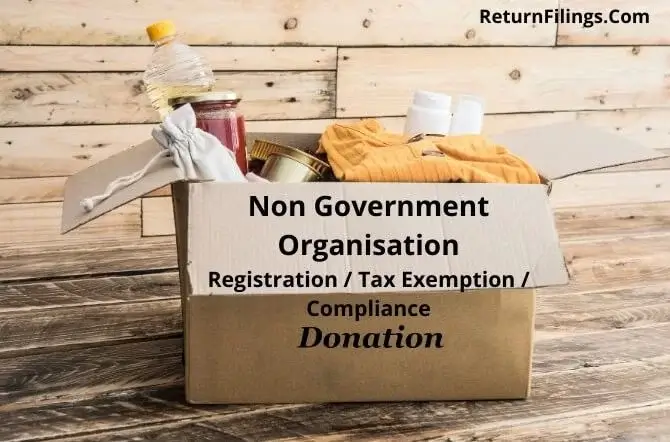Non Government Organisation (NGO) Registration in India: Types, Eligibility & Compliance Checklist
1. Introduction to NGO Registration
Non Government Organisation play a significant role in social, environmental, and humanitarian causes. They operate without government aid and focus on public welfare initiatives. Registering an NGO provides legal recognition, tax benefits, and credibility, allowing the organization to function effectively and gain public trust.
2. Types of NGO Registration in India
In India can be registered under three primary legal frameworks:
2.1 Trust Registration
A trust is a legal arrangement where property or assets are held by trustees for the benefit of others. Trusts are governed by the Indian Trusts Act, 1882 and are the preferred option for philanthropic activities.
Key Features:
• Easy formation process
• Limited liability for trustees
• Can hold immovable property
Steps for Trust Registration:
Decide on a Name: Choose a unique name for the trust.
Select Trustees: Minimum two trustees are required.
Draft Trust Deed: Essential details include trustee names, governance structure, and financial provisions.
Submit to the Registrar: Trust Deed must be signed and submitted.
Obtain Registration Certificate: Issued by the Registrar upon verification.
2.2 Society Registration
A society is a membership-based organization registered under the Societies Registration Act, 1860, and is ideal for civic and welfare projects.
Key Features:
• Flexible governance structure
• Easy to modify bylaws
• Can hold immovable property
Steps for Society Registration:
Draft Memorandum of Association (MOA) and Rules & Regulations: Define objectives, governance, and operational rules.
Gather Members: Minimum of seven members are required.
Pass a Board Resolution: Define office-bearers and their responsibilities.
File Application with the Registrar: Submit an affidavit and required documents.
Pay the Registration Fees: Varies by state.
Obtain Society Registration Certificate: Issued after approval.
2.3 Section 8 Company Registration
A Section 8 Company, under the Companies Act, 2013, is a non-profit entity focusing on social causes with better credibility and long-term sustainability.
Key Features:
• Tax exemptions
• Legal recognition and credibility
• Greater sustainability
Steps for Section 8 Company Registration:
Obtain Digital Signature Certificate (DSC) and Director Identification Number (DIN): Required for directors.
Reserve a Unique Name: Apply via the RUN (Reserve Unique Name) form.
Prepare Documents: MOA, AOA, address proof, and declarations.
Submit Application and Fees: Process through the MCA portal.
Verification and Approval: Registrar issues the registration certificate.
3. Benefits of NGO Registration
Registering an NGO offers numerous advantages, including:
• Legal Recognition: Establishes credibility.
• Tax Exemptions: NGOs can apply for Section 12A and 80G tax benefits.
• Access to Funding: Enables government and corporate grants.
• Eligibility for Government Programs: These type of entities can participate in welfare schemes.
• Brand Value: Improves public perception and donor confidence.
• Liability Protection: Separates personal and organizational liabilities.
4. Eligibility Criteria for NGO Registration
To register, the following conditions must be met:
• Non-Profit Motive: The organization should not operate for commercial gain.
• Legal Status: Must be registered under the appropriate law.
• Memorandum of Association (MOA): Clearly define objectives and governance.
• Board of Directors/Trustees: Experienced individuals with credibility.
• Transparent Accounting: Maintain proper books and undergo regular audits.
• No Discrimination: Must be open to all sections of society.
5. Tax Exemptions for NGO's
In India these entities can apply for tax exemptions under the Income Tax Act:
• Section 12A: Provides tax exemption for receipts / income
• Section 80G: Enables donors to claim deductions on contributions.
Case Study: Tax Benefits in Action
An NGO registered under Section 8 applies for 80G certification and successfully attracts corporate donors, who contribute due to the tax deduction benefits.
6. Additional Legal Compliance
After registration, it must fulfill various regulatory requirements:
• PAN Application: Essential for financial transactions.
• GST Registration: If applicable based on turnover.
• TAN (Tax Deduction Account Number): Required for tax deductions.
• FCRA Registration: Required for receiving foreign contributions.
7. Why Choose ReturnFilings.com for NGO Registration?
We provide:
• Expert Guidance: End-to-end registration support.
• Customized Solutions: Tailored legal and financial advice.
• Time-Saving Processes: Quick and hassle-free registration.
This guide ensures you understand the complete process of NGO registration in India, including legal frameworks, benefits, and compliance requirements. Let ReturnFilings.com assist you in establishing your NGO efficiently!
With expert assistance from Return Filings, you can ensure a smooth registration and compliance process for your Non-Government Organisation (NGO). For professional assistance, reach out to us on email: info@returnfilings.com or on whatsapp: https://wa.me/919910123091.
frequently asked questions (faq's) related to Non-Governmental Organization (NGO) Registration in India
Q What is a Non-Governmental Organization (NGO)?+
A An NGO is a non-profit organization that operates independently of the government and is typically established for charitable, social, educational, advocacy, or other public-benefit purposes.
Q What are the common legal structures for NGOs in India?+
A The most common structures are:
• Trust: Governed by trust law, created by a trust deed.
• Society: Registered under the Societies Registration Act, focuses on specific objectives.
• Section 8 Company: A company registered under Section 8 of the Companies Act, 2013, for charitable or not-for-profit purposes.
Q What are the types of NGO registration?+
A NGOs are not "registered" in a single, overarching way. Instead, they are registered under one of the legal structures mentioned above (Trust, Society, or Section 8 Company). They may also seek additional registrations or certifications, such as:
• 12A Registration: For income tax exemptions.
• 80G Registration: For donors to claim tax deductions on donations.
• FCRA Registration: For receiving foreign contributions.
• NITI Aayog Registration: For partnering with the government.
Q What are the minimum members required to register an NGO?+
A The minimum number of members varies depending on the legal structure:
• Trust: Generally requires a minimum of two trustees.
• Society: Varies by state, but generally requires a minimum of seven members.
• Section 8 Company: Requires a minimum of three directors.
Q What are the primary posts involved in an NGO?+
A Key positions often include:
• Trustees/Governing Body Members/Directors: Responsible for the overall governance and management of the NGO.
• President/Chairperson: Leads the organization.
• Secretary/Treasurer: Handles administrative and financial matters.
• Other roles: May include program coordinators, project managers, and staff.
Q Should one register a trust or a society?+
A The choice depends on various factors, including the objectives of the NGO, the level of control desired, and the target beneficiaries. Generally:
• Trusts: Offer more flexibility but can have less structured governance.
• Societies: Have a more defined membership structure and focus on specific objectives.
Q Where should one go to register my NGO?+
A The registration authority depends on the chosen legal structure:
• Trust: Register with the sub-registrar having jurisdiction over the trust's registered office.
• Society: Register with the Registrar of Societies in the respective state.
• Section 8 Company: Register with the Registrar of Companies (RoC) through the MCA portal.
Q Can a government employee become a trustee?+
A Government employees may be allowed to serve as trustees in some cases, but there might be restrictions or the need for prior permission. It is best to consult with legal experts on this matter.
Q How much money is required to start an NGO?+
A There is no minimum capital requirement in the strictest sense for starting an NGO. However, you will need funds to cover registration fees, operational expenses, and initial program costs. The actual amount depends on the scale and nature of your NGO's work.
Q An Office and Landline Must for Registering the NGO?+
A While not always a legal requirement for registration itself, having an office address is practically essential for an NGO to operate effectively and for official communication. A landline is not mandatory in most cases, but a functional communication channel is important.
Q How to get government funding for my NGO?+
A Government funding opportunities are available, but they are competitive. The process usually involves:
• Identifying relevant government schemes and grants.
• Preparing a detailed proposal outlining the NGO's project and budget.
• Applying to the concerned government department.
• Meeting eligibility criteria and complying with guidelines.
Q Is the trust taxable without 12A registration?+
A Yes, a trust is taxable even without 12A registration. However, 12A registration provides exemption from income tax on the trust's income if it meets the necessary conditions.
Q How do I register an NGO in India?+
A Covered in the registration process details.
Q What are the documents required for NGO registration?+
A Varies based on the chosen legal structure.
Q How do I get funding for my NGO?+
A Various sources, including donations, grants, and government funding.
Q What are the tax benefits for NGOs in India?+
A 12A, 80G, and other exemptions, subject to meeting criteria.
Q How do I manage an NGO effectively?+
A Good governance, transparency, and accountability are essential.
Q What are the legal requirements for running an NGO in India?+
A Compliance with various laws, including income tax, FCRA, and labor laws.
Q How do I dissolve an NGO?+
A The process varies based on the structure and is governed by applicable laws.
Q Can an NGO own property?+
A Yes, NGOs can own property in their name.
Q How do I choose a name for my NGO?+
A The name should be unique and reflect the NGO's objectives.
- For further reading, explore the following topics:
- 🏛️ NGO Incorporation in India: Section 8 Company Registration, Benefits & Eligibility
- 📘 NPO Registration in India: Types, Legal Process & Tax Exemption Guidelines for 2024
- ✅ Eligibility Criteria for Section 12A & 80G Registration for NGOs in India: Benefits & Application
- 📝 How to Apply for FCRA Registration in India: Eligibility, Procedure & Annual Compliance for NGOs

